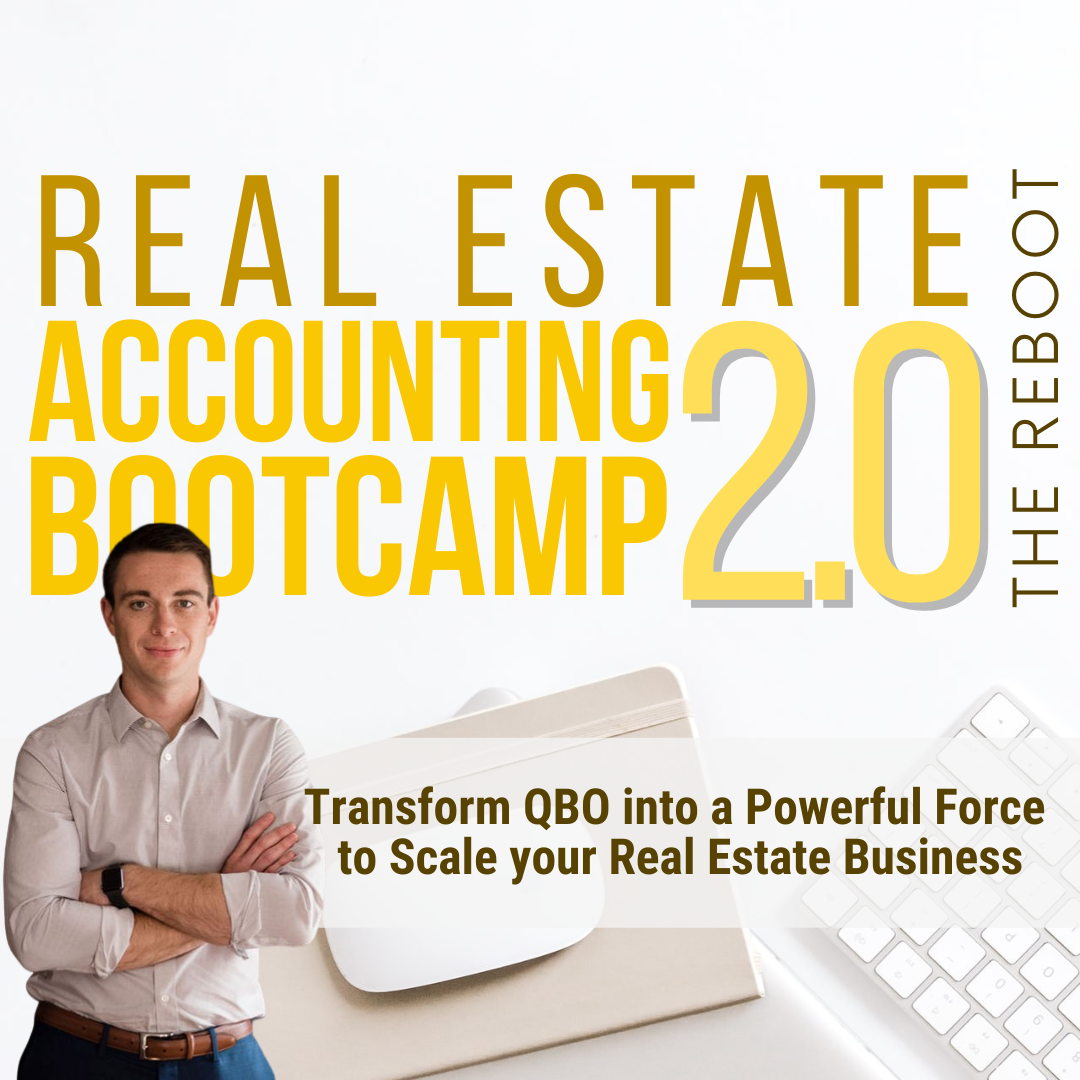As a real estate investor, you live by numbers. A good portion of success comes from running the numbers, analyzing deals, and making offers where the numbers work. The best investors have a good CPA / accountant in their corner or have gone through a real estate investing accounting course.
Regardless of your strategy — fix and flip, hold and rent, or wholesaling — you need an accounting system that delivers reliable financial data to make timely decisions and keeps you out of trouble with the IRS.
Whether you plan to outsource your bookkeeping to an accountant or bookkeeper, you need to maintain financial accountability.
You are responsible for your books. You need to know if your accountant is recording transactions right and organizing your books properly.
By understanding specifically how to use Quickbooks Online in your real estate business, you can:
- Spend less time reconciling your books and preparing for taxes
- Scale your real estate investing business
- Organize your finances
In this article, we’re looking at a highly-rated real estate investing accounting course, Real Estate Accounting Bootcamp 2.0.
What Is Real Estate Accounting Bootcamp 2.0
Real Estate Accounting Bootcamp 2.0, or REAB 2.0, is the updated, newly launched accounting course that helps real estate investors turn their Quickbooks Online solution into a powerful force that allows them to scale their real estate business.
The course is created by Nick Baldo, founder of Income Digs, a former Fortune 100 operations consultant turned real estate investor and high-end home remodeling business owner.
REAB 2.0 looks to help real estate investors scale their investment practice by establishing proven architecture for your accounting books, establishing sustainable processes for managing your books and money, and utilizing rules to free up your valuable time to invest more and reconcile less.
In this course you will learn common best practices for real estate investing accounting.
Set Up Your Investing Books
In the first module of REAB 2.0, you will learn best practices for setting up your Quickbooks Online for real estate investing.
Too many real estate investors make the mistake of diving in and using Quickbooks’ default options. Nick shows real estate investors how to create a bulletproof foundation that allows an investor’s accounting system to scale with them.
From the investor that does a flip or two a year to the investor running a large company completing 20+ transactions per year.
Properly Record EVERY Transaction
One of the hardest parts about accounting, specifically for real estate investors, is categorizing transactions.
Is it an expense or does it need to be accounted for as a capital improvement with depreciation? How do you record those different transactions?
There’s also multiple ways to purchase a property. You can purchase with cash, bank loans, hard-money loans, or a mixture of all those methods.
Each of those transactions are typically treated differently.
In the remaining modules of Real Estate Accounting Bootcamp, you will learn how to record the most common transactions, such as:
- Purchasing Property: Translate your HUD statement into QBO
- Renovate & Rehab Property: Understanding capital improvements, depreciation, and deductible expenses
- Selling Property: When it’s time to dispose of an asset, you will confidently be able to clear out CapEx and depreciation.
Scale Your Books
Accounting shouldn’t be done only once per year. Nor should you spend hours inside your Quickbooks trying to record transactions.
In another set of modules, you will learn to track expenses and recurring transactions using rules. This will help you automate your finances.
Free up your time to focus on investing while still being able to quickly and frequently produce the right kind of reports to analyze your investment performance.
Real Estate Accounting Live Q&A
The biggest selling point to the course is the Live Q&A offered by Nick Baldo. It’s one thing to get all of the accounting information and another to get live support where the course creator will troubleshoot with you.
With this feature, you can gain clarity and get answers to questions for your specific investment situation.
It’s easy for one-hour of real estate accounting consulting to cost $200+ per hour depending on where you seek help.
So, if you get stuck at any point throughout the course, you can attend a Q&A with Nick.
What’s To Like And Not Like
This course is one-of-a-kind and pretty much the only course on the market that helps real estate investors get their accounting, bookkeeping, and money under control.
The “Live Q&A” in the Real Estate Accounting Bootcamp 2.0 is likely one of the biggest features of the program.
This course can also save you hundreds or thousands of hours. Yes, this information is out there for free, but you would need to scour support article after article on Intuit’s forums and articles to find your answers.
Instead, you can learn the step-by-step process for building a solid financial foundation as a real estate investor.
If you’re looking for a real estate accounting course that focuses more on financial analysis, this isn’t the course for you.
For example, this course will not teach you financial modeling, how to analyze deals, or how to take rent-rolls and forecast investment performance.
Rather, this course is about setting up your Quickbooks, managing your transactions, and tracking your money to make tax time easier and get the reports you need to grow your real estate business.
If you’d like to get a feel for the quality of content in this course, you can check out some of Nick’s free content on his YouTube channel.
GET REAL ESTATE ACCOUNTING BOOTCAMP
Conclusion
If you’re ready to have organized and accurate financials, have real-time financial data, gain clarity, and cut down on the time it takes to reconcile your books, then this is the real estate accounting course for you.
If you’re ready to have organized and accurate financials, have real-time financial data, gain clarity, and cut down on the time it takes to reconcile your books, then this is the real estate accounting course for you.
- Established a proven architecture for your accounting books
- Learned how to manage the day to day financials of your Investing Business
- Set up a financial reporting structure to provide you with real-time information and metrics
- Freed up your valuable time to invest more and reconcile less





